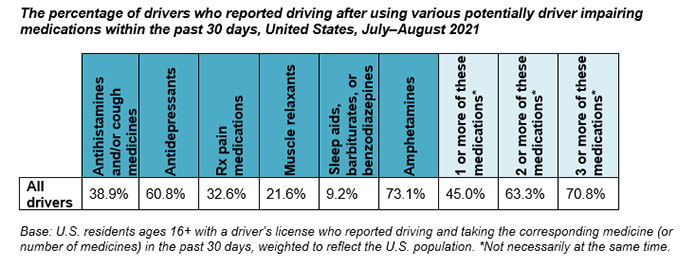A new study from the AAA Foundation for Traffic Safety finds that half of drivers surveyed say they used one or more potentially impairing medications in the past 30 days. Many who took medications to treat depression, pain, or sleep issues were not warned by their healthcare provider regarding the possible dangerous impact on driving. And many drivers don’t realize how these meds can impact their ability to drive safely.
Many potentially driver impairing (PDI) medications can have effects that can be dangerous when mixed with driving, including dizziness, sleepiness, fainting, blurred vision, slowed movement, and attention problems.
“Our research finds that many drivers are taking one or more potentially impairing medications before getting behind the wheel, and many drivers don’t realize the impact these drugs can have on their decision-making and reaction time,” says Marie Dodds, public affairs director for AAA Oregon/Idaho.
AAA recommends that the advice given by medical and pharmacy professionals about the dangers of mixing over-the-counter and prescribed medications with driving must be greatly improved and more consistently emphasized to maximize traffic safety. AAA says medical professionals need to provide clear advice to their patients of the possible risks and ensure they understand them.
This study focused on the prevalence of recent use by drivers of commonly used prescriptions and over-the-counter medications such as:
- antihistamines and cough medicines (such as Claritin, Allegra and Benadryl),
- antidepressants (such as Prozac, Zoloft and Wellbutrin),
- prescription pain medicines (such as Tylenol with codeine, OxyContin, Percocet, and Vicodin/hydrocodone),
- muscle relaxants (such as Soma and Flexeril),
- sleep aids (such as Ambien, Lunesta, phenobarbital, Xanax, Valium and Ativan),
- amphetamines (such as Adderall, Dexedrine, and phentermine).
These are PDI medications, but not all drivers who reported taking them were impaired. As the term implies, PDI medications can potentially impair driving, but effects in individuals may vary.
Antihistamines and cough medicines—many available without a prescription—were most commonly used. However, the proportion of drivers that reported driving after use was highest for those who reported amphetamine use, such as Adderall and Dexedrine, as shown in the table below.









